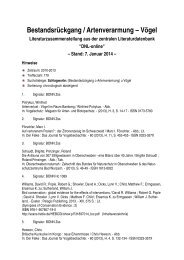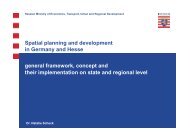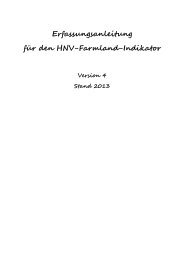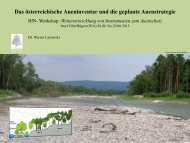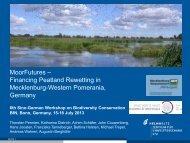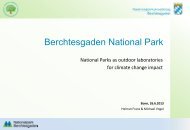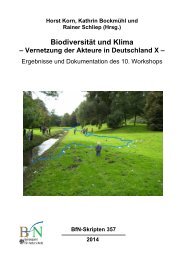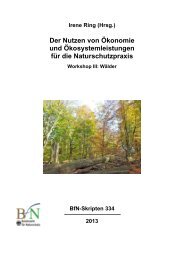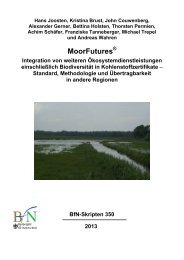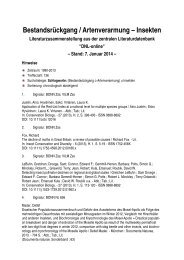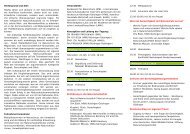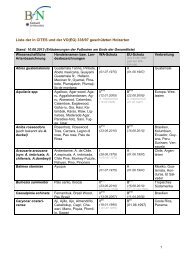Caring for Pollinators - Bundesamt für Naturschutz
Caring for Pollinators - Bundesamt für Naturschutz
Caring for Pollinators - Bundesamt für Naturschutz
You also want an ePaper? Increase the reach of your titles
YUMPU automatically turns print PDFs into web optimized ePapers that Google loves.
Ssymank, Hamm, Vischer-Leopold & Wittmann Introduction<br />
Today we understand that bees and other pollinators have an outstanding function in ecosystems<br />
because they literally maintain terrestrial plants. In other words, pollination ranks<br />
with photosynthesis as the most important processes in plant life. Today we indeed have to<br />
be somewhat afraid that the golden days of bees on earth are about to end. Although there<br />
are more than 25,000 bee species, we are losing pollinators in agricultural areas, where we<br />
need them most. And losing pollinators means losing fruits, seeds, and money - about € 153<br />
billion per year .<br />
Flies represent one of the largest insect groups of the world with approx. 160.000 species in<br />
162 families. They play a major role in pollination of wild plants and crops with over 70 families<br />
known to visit regularly flowers.<br />
No chocolate without flies! Who knows that the cocoa-tree is pollinated by small midges and<br />
that only fly-pollination will yield the cocoa-fruit, refined into chocolate, a product that had an<br />
overwhelming triumphant success shortly after its introduction in Europe.....<br />
This is just one example of many crops and flies are second in their importance as pollinators<br />
compared to the better-known bees. They have been largely neglected and have special<br />
importance <strong>for</strong> example in sub(arctic) or high altitude ecosystems, in the understory of tropical<br />
<strong>for</strong>ests and many wild plants worldwide are almost exclusively pollinated by flies. While a<br />
few groups of flies are known as vectors of diseases, the major part of the flies are beneficial<br />
and essential in their pollination services, in decomposing organic material or as biological<br />
control agents.<br />
More than 200 years after Sprengel’s insight, some 40 scientists initiated the International<br />
<strong>Pollinators</strong> Initiative (IPI) in Sao Paulo, Brazil. The decline in numbers of the natural pollinators<br />
has lead to the composition of the “Sao Paulo Declaration on <strong>Pollinators</strong>” <strong>for</strong> the protection<br />
and sustainable use of pollinators 1998 in Sao Paulo within the scope of the International<br />
<strong>Pollinators</strong> Initiative and to its signing at the 5th Conference of Parties (COP 5) of the<br />
Convention on Biological Diversity.<br />
In April 2002 the Convention on Biological Diversity (COP 6) adopted the Decision VI/5, a<br />
“Plan of Action <strong>for</strong> the International Initiative <strong>for</strong> the Conservation and Sustainable Use of<br />
<strong>Pollinators</strong>” prepared by the Food and Agriculture Organization of the United Nations (FAO)<br />
together with leading pollination scientists<br />
(http://www.bees<strong>for</strong>development.org/info/info/pollination/international-pollinator-.shtml). This<br />
plan under the leadership of the FAO aims to promote co-ordinated action worldwide to:<br />
• Monitor pollinator decline, its causes and its impact on pollination services,<br />
• Address the lack of taxonomic in<strong>for</strong>mation on pollinators,<br />
• Assess the economic value of pollination and the economic impact of decline of pollination<br />
services, and<br />
• Promote the conservation and the restoration and sustainable use of pollinator diversity<br />
in agriculture and related ecosystems.<br />
2




